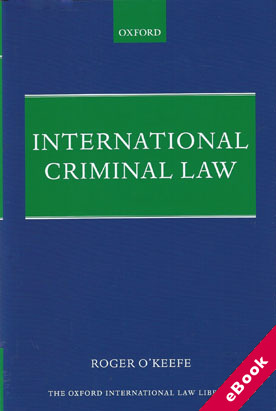We are now closed for the Christmas and New Year period, returning on Monday 5th January 2026. Orders placed during this time will be processed upon our return on 5th January.

The device(s) you use to access the eBook content must be authorized with an Adobe ID before you download the product otherwise it will fail to register correctly.
For further information see https://www.wildy.com/ebook-formats
Once the order is confirmed an automated e-mail will be sent to you to allow you to download the eBook.
All eBooks are supplied firm sale and cannot be returned. If you believe there is a fault with your eBook then contact us on ebooks@wildy.com and we will help in resolving the issue. This does not affect your statutory rights.
International criminal law has seen significant developments in recent years, as the jurisprudence of the International Criminal Court has expanded, alongside the practice of other international criminal tribunals. International criminal law is increasingly a concern of domestic courts as well, with international legal issues arising from domestic cases.
This book presents a comprehensive overview of the field, assessing the subject in the context of wider public international law. In particular, this book complements discussion of the 'core crimes' of genocide, crimes against humanity, and war crimes, with a full treatment of wider issues that arise.
These include the international rules governing national criminal jurisdiction; the crime of piracy; the raft of multilateral treaties defining and creating obligations in respect of international crimes, including terrorist crimes, and of the so-far unsuccessful attempts to conclude a comprehensive convention on terrorism; the prosecution and punishment of international crimes at the national level; and the activities of the United Nations Security Council in relation to international crimes.
This book provides an in-depth study of the ways in which domestic courts prosecute international crimes. Its analysis encompasses the international rules on the permissible reach of national criminal jurisdiction; the substantive law of international crimes; the prosecution and punishment of international crimes, and the prosecution and punishment of municipal crimes by international criminal courts or by municipal courts with international elements; and the involvement of international organs, such as the United Nations Security Council, in the suppression of international and municipal criminal wrongdoing.
The book also includes more formal conceptual analysis of the very notion of an 'international crime' and of an 'international criminal tribunal', as well as a detailed account of the rise of individual criminal responsibility under international law. The book is written in a direct, concise, and precise style, making it a perfect resource for ICL practitioners, as well as scholars and advanced students.